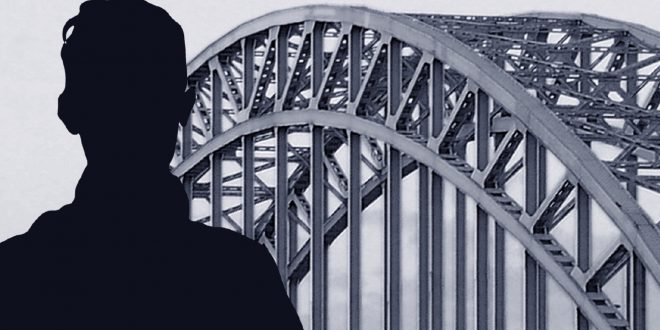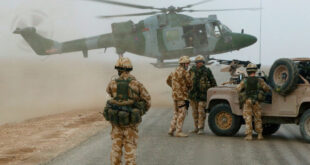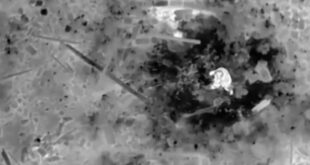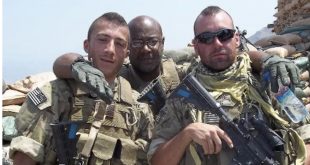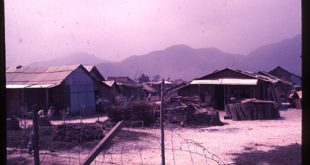When Gene Metcalfe boarded the C-47 that would drop him just outside of Nijmegen, Holland, a British lieutenant gave him a box of condoms. Gene was to be among the first to jump into what should have been a picture-book meadow, free of German troops. Instead, it was defended by three German antiaircraft cannon emplacements. As he jumped into a hail of bullets and exploding shells, he watched his plane roll over and plummet into the ground. It was at that moment he realized the condoms had either been a bad joke, or the planners of Operation Market Garden had seriously underestimated German resistance. Here is his story.
by Marcus Naninni
Gene had no idea how long he’d been unconscious; he found himself lying on his back, his helmet nowhere in sight. His head was splitting so badly he thought he’d been struck a direct blow from a hammer and his right ear burned. He felt as if there were weights on top of his legs, locking him into place, and an annoying, loud buzz rang inside hishead. He rubbed his cheeks, checking whether his face felt contorted.
When he attempted to stand, a stomach-churning, spinning sensation violently slammed him back into the ground where he decided to remain, eyes pressed shut. He thought if he closed his eyes as hard ashe could the spinning sensation might go away. After a few moments he opened them again, only to discover his brain still thought he was on a merry-go-round.
Gene made a couple of attempts to get hold of himself, for he had a bad feeling time was not on his side. He needed his body to cooperate; his hard, back-of-the-head nighttime landing at Fort Benning briefly came to mind. He recognized this injury was worse, much worse than before.
He couldn’t figure out why it was so silent and considered the possibility everyone might be dead. Certain there had never been an order to fall back, Gene nevertheless had the unpleasant feeling he was all alone. The unsettling realization his patrol had either disappearedor been wiped out was slowly sinking in. Keeping his eyes closed seemed to ease the headache and the spinning sensation. Hepurposefully didn’t move a muscle, lest he attract unwanted attention, as he thought to himself: “I just need a little time to regain control of my body then I can get the hell outta here.”
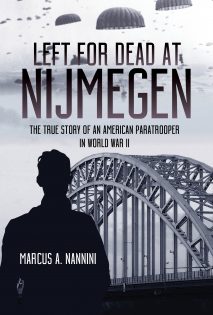
No more than a few minutes passed when Gene felt something poking into his gut. He opened his eyes and in the darkness realized a German soldier was pressing a rifle into his stomach, checkingwhether he was alive or dead. Gene’s eyes opened wide as he realized his precarious situation. In response, the surprised German immediately backed off a couple of steps and began shouting “Aufstehen! Aufstehen!” while pointing his rifle directly at Gene’storso. Gene didn’t know what the term meant but he had a pretty good idea and tried to stand.
It took some effort but Gene made it to his feet, when dizziness again kicked in and his knees buckled beneath him. The German-grabbed his arm and helped hold him upright. Gene put his hand to his right ear and felt a sticky liquid; he realized he was bleeding and assumed he’d been shot though he didn’t feel as if he’d taken a bullet. The very loud buzzing in his ear made hearing difficult and contributed to the feeling of being disconnected from reality.
He momentarily considered the possibility he was dreaming, or worse yet, dead. Feeling the ground beneath his boots and the grip of his German captor firmly holding his left arm, he concluded he wasn’t dead. Then he noticed the lapels on the German’s tunic bore the dreaded “SS” markings and a skull and crossbones insignia was painted on the side of his helmet. The German was sporting two medals on his tunic so Gene knew this guy was a veteran and most definitely was not an old man or a boy. It then dawned on him his own patrol was not to take any prisoners, so he assumed the Germans were operating under a similar mandate and began thinking this might be the end of the line for him. He didn’t want to let his captor think he was scared, though he was, and the fact he was genuinely having difficulty maintaining his balance helped him disguise his fear.
Soon he was surrounded by a squad of “SS.” Their sergeant assigned two of the men to escort Gene and pointed the three of them in the direction of the road bridge. As they began walking, at the best pace Gene could manage, he concluded they were probably going to execute him. Gene still had a phosphorous grenade in his right pants pocket, so when the time came he figured he wouldn’t be dying alone as he intended to use it.
They were only about 20 yards up the road when a German soldier appeared out of the dark, walking very deliberately toward Gene and pointing his rifle in a distinctly ominous manner. He came right up to him and pressed the rifle into the center of Gene’s forehead, while shouting what Gene figured were probably obscenities. He could see the rifling inside the barrel as the upset soldier brought the gun to his head. He had never been so afraid in his life.
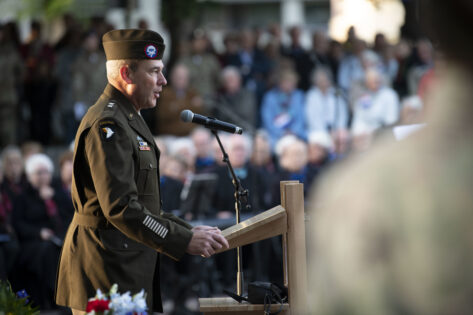
speaks at the Son en Bruegal commemoration in Nijmegen, Netherlands, Sept. 17, 2019.
This year, 2024, marks the 80th anniversary of Operation Market Garden in the Netherlands.
The two guards took a few steps back, deferring to the fact the screaming German was a corporal. Gene wondered if he would have enough time to lower his hands, which were half-raised in the air, yankout the grenade, and take some Germans with him, when he came to the sobering realization: “Well, this is where it ends; I’m not going home.” Just as Gene was about to try to slip his right hand into hispocket to retrieve the grenade, he heard a voice shouting in German, out of the darkness ahead. He glanced up the road and spotted a German officer leading a group of about 30 soldiers. They were quickly running toward him. The out-of-control “SS” corporal didn’t lower his gun. It was as if, in his anger, he didn’t hear the officer shouting at him as he continued screaming uncontrollably at Gene while keeping his rifle pointed at his forehead.
The officer, an “SS” colonel, ran up to the corporal, paused amoment as he gave Gene a brief once-over, and proceeded to violently swat the rifle right out of the corporal’s arms. The corporal was taken by complete surprise as the look on his face changed from outrage to fear when he realized he was facing a colonel. The colonel immediately unleashed a loud and dramatic verbal tirade upon him, thoroughly humbling the would-be executioner.
In a strange way Gene felt some pity for the man, as he’d been the recipient of numerous such tongue-lashings himself. Gene also assumed he and his patrol had just killed a number of the corporal’s comrades so he understood his anger. In response to the colonel’s lecture the corporal lowered his eyes and mumbled a few words, finishing with “Ja, meine Standartenführer.”
The term “führer” caught Gene’s attention, as he momentarily considered whether the officer might be Adolf Hitler in the flesh. He stared at the officer, but it wasn’t Hitler. Gene’s situation had improved, but with so many “SS” around him it was his opinion all the officer had done was to buy him a little time.
Nobody gave him a body search so he retained his grenade, intending to use it when the end was imminent. About four “SS” soldiers quickly surrounded him, one of whom offered Gene a cigarette. Gene, though not a smoker, accepted it, using the only German word he knew: “Danke.”
Smiling, the German pulled out his lighter, the skull and crossbones insignia of the “SS” emblazoned on its side, and lit the cigarette. Gene discovered it did ease some of the queasiness which had been dogging him since he regained consciousness. Soon about eight more “SS” soldiers appeared out of the darkness and surrounded Gene, looking him over as if he were an interesting exhibit.
One of them removed his helmet and stood next to Gene to point out how Gene, at 6 foot 4 inches tall, towered over the German. One of his comrades made a comment in response, to which they all began laughing. It was about then Gene started to consider the possibility they weren’t going to execute him after all and allowed himself to relax a little. The “SS” men engaged in a conversation with him through a combination of broken English and sign language, as if they were all friends who just happened to be wearing different uniforms than his.
One of the Germans tried to explain they didn’t understand why the Americans were fighting them when they should be fighting together. He made it clear the Americans and British should be fighting their real enemy, namely, the Communist Russians. Gene realized they were apparently unaware Germany had declared war against the United States, not the other way around. Given the circumstances he didn’t attempt to offer an explanation. He was experiencing an incredible headache and was still queasy. Engaging in a sign language-enriched discussion with some “SS” men was just about the last thing he wanted to be doing.
In the interim the colonel had been conferring with another officer. Gene was taken aback when he abruptly turned, pointed to him, and said in very good English: “This way, paratrooper!”
“Yes Sir,” was Gene’s instinctive response. His feet were still unsteady, but at least the dizziness had let up enough for him to walk without assistance as long as it was at a slow pace.
After a brief pause, while the four “SS” German escorts conferred among themselves, they proceeded up the road in the direction of the objective of Gene’s patrol, the road bridge over the River Waal. Genenever anticipated reaching the bridge as a prisoner.
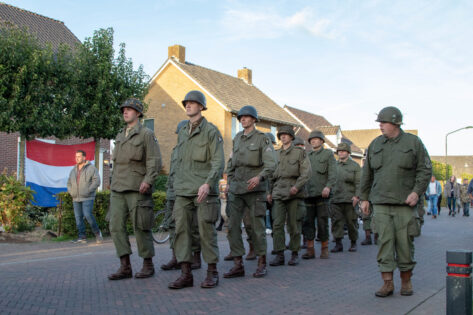
As they began making their way to the rear Gene observed a German “88” and a machine gun were dug in on the hill commandingall the approaches into the Plein. A little further ahead a quadruple anti aircraft gun was mounted on a truck parked beneath the protective canopy of a tree, camouflaged to appear to be nothing other than alarge bush.
He observed a squad of German Fallschirmjäger, paratroopers, taking up defensive positions. Unfortunately, the vast majority of the Germans he saw were veterans. Eventually he witnessed the sort of soldiers the British and his own general had led him to believe composed their opposition; a mixed platoon of very youthful as well as elderly soldiers. He wondered what became of the two flanking patrols and if they also found themselves up against an “SS” combat group.
It would be many decades before he would learn that Lieutenant Foley’s patrol, catching up with his own patrol from the east, had arrived just in time to engage the German troop transports and that bazooka fire was responsible for the massive explosion at the moment he pulled the trigger of his rifle. Gene was actually lucky to have been captured by the 10th SSPanzer.
Division “Frundsberg.” It would come to be known as the only “SS” division that didn’t commit atrocities and would be recognized as having fought a “clean” fight, unlike the balance of the “SS” divisions in World War II. They didn’t shoot their prisoners or, for that matter, civilians. Being captured by them was actually a stroke of good fortune; he would live to see another day.
Gene was held as a POW outside Munich. He briefly escaped, and was captured within sight of the snow-capped Swiss mountains. His camp was liberated by American troops in April 1945.
Excerpted from Left for Dead in Nijmegen: The true story of an American paratrooper in World War II.
 Soldier of Fortune Magazine The Journal of Professional Adventurers
Soldier of Fortune Magazine The Journal of Professional Adventurers


